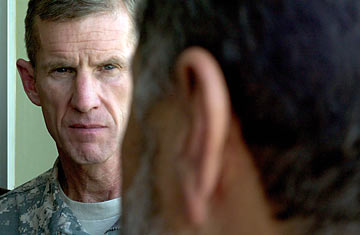
Following the murder of the chief of police and an outbreak of fighting by insurgents in the city's streets, General Stanley McChrystal, newly appointed head of forces in Afghanistan, is briefed by an Afghan National Army commander at a base in Kandahar
(7 of 7)
I understand you have the new Kindle. What are you reading?
The Afghan Wars, from 2002.
I listen to most books on my iPod. I listen when I work out, and I read when I have time. My wife puts all the books on my Kindle for me.
[He shows it to me. He has underlined a quote in the book: "There is no kingdom without an army, no army without wealth, no wealth without material prosperity and no material prosperity without justice."]
I am a big believer in justice. I believe people fight when they don't have justice. And so if you want to stop this fighting, let's bring justice.
How do you do that?
In the most basic way, we provide an environment in which they can set up enough rules of law and have justice. But we can't just go in and say, "O.K., we provided security, you guys have a good day," and walk away. It's so interrelated that we have to do it in partnership with the Afghan government and all the different agencies that bring expertise to help set up rule of law. It's got to be done in partnership. If you go in and provide security, and there is a lag in the time it takes to provide governance and development, then they are just occupied. And that is not what they want.
Do you think you have the tools to provide all this?
We can always use more tools. The first and foremost is, if they offered me a choice between two more divisions or 1,000 people who spoke Pashto and Dari and had a passion for this place, I would absolutely take the 1,000. Actually, I'd even take 500 over those two divisions. Because that is the leverage here. It's the people who understand the situation. It's not blunt instruments that work. You do need some straight military boots on the ground, numbers to provide, so it can't be all just expertise. But at the end of the day, it has to be an Afghan solution, and for us to help, we have to understand. We have to develop relationships, we have to have continuity, we have to have ownership. You can't do that on short tours where you come in and you are going to go back to your old job and not be waiting for the outcome.
Can you think of any other interesting, educational experiences here in Afghanistan?
Some years ago I went to a little village called Kantiwa, up in Kunar province. It's way up there: there is no road, several hours from the closest road, and we were looking for a bad guy. And as we got up there, several things struck me. We had a vision of what it would be like, and we were planning to offer the villagers a road to the area. First thing that struck me was that there were electric lights — in the middle of nowhere. They had a little water-powered generator system. And then as we talked with them, there was a countergovernment feeling there, but it wasn't ideological. It certainly wasn't Islamic extremism. And we told them we were going to bring them a road. And they said, "Oh no, no roads. If you put a road here, people will drive up and take our timber." Right away that teaches you that if you don't understand, and you put in a road — just like Greg Mortenson found out [when] he wanted to build a school but the villagers needed a bridge — sometimes you have to stop and figure things out. They are not illogical. They are rational. So what they want and why they do things is often based on things we don't understand. So first, you have got to understand that, and then go from there.
You are known for your handwritten notes — of thanks, consolation or congratulations. Why do you do this?
Because I believe that I must thank the people I work with, and I think if you write a handwritten note — that I took the time to sit down and write — if I typed it, people may think that I may have dictated it or written 50 of the same and just signed it. And I also find that if I hand-write it, it also makes me stop and think — think about the casualties. It makes me think about everyone.
You wrote seven notes of consolation on your first day.
I've been in war a long time, so it wasn't the sudden shock of losing people. But if you read the circumstances of every servicemember's death, it makes you think about what you are doing here. It stops being a number and becomes a person. If you write their next of kin, it makes you realize the impact on them as well.
